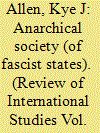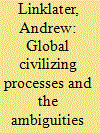| Srl | Item |
| 1 |
ID:
185796


|
|
|
|
|
| Summary/Abstract |
While scholars within the English School have increasingly approached the traditionally liberal concept of solidarism in a normatively agnostic fashion, the idea of an ‘illiberal solidarism’ and historical manifestations thereof remain underexplored. One notable case in point surrounds the peculiar body of Italian interwar international thought, herein referred to as ‘international Fascism’. By discerning a synchronic outline of international Fascism, alongside the manner by which this project mutated and ultimately failed as it transformed from a vision theorised in the abstract to a practical initiative under the auspices of the Fascist regime, this article offers historical and theoretical insights into the realisability of illiberal forms of solidarism. Combining this historical account with theoretical insights derived from Reus-Smit's study on international order under conditions of cultural diversity, this article argues that the realisation of some form of solidarism necessitates the acceptance of a substantive pluralist component. Yet messianic illiberal visions that endeavour to retain the states-system, while simultaneously asserting the superiority of one community or a highly exclusionary vision of the ‘good life’, ostensibly lack the capacity to reconcile the contradictions inherent in efforts to universalise such projects.
|
|
|
|
|
|
|
|
|
|
|
|
|
|
|
|
| 2 |
ID:
097730


|
|
|
|
|
| Publication |
2010.
|
| Summary/Abstract |
Increased social power over the millennia has led to remarkable achievements in varied spheres of endeavour while introducing new possibilities for more destructive forms of harm over greater distances. Efforts to create moral frameworks to protect persons from senseless harm have been critical replies to the ambiguities of human interconnectedness. Over the millennia, societies have become entangled in global 'civilizing processes' such as the systems of communication that now encompass humanity as a whole, enabling different peoples to become better attuned to each other. Societies of states have immense significance for that long-term development. They have been arenas in which independent communities have discovered the prospects for, as well as the constraints on, agreements on norms that can be anchored in the most readily available points of solidarity between strangers - those vulnerabilities to mental and physical suffering that are shared by human beings everywhere. The recovery of 'universal history from a cosmopolitan point of view' can examine the contribution that international societies have made to global civilizing processes that harness such solidarities to restrain the human capacity to cause violent and non-violent harm to distant peoples. It can support the normative project of promoting global civilizing processes that employ unprecedented levels of collective power to reduce the tragic effects of the ambiguities that have accompanied long-term trends towards higher levels of human interconnectedness.
|
|
|
|
|
|
|
|
|
|
|
|
|
|
|
|